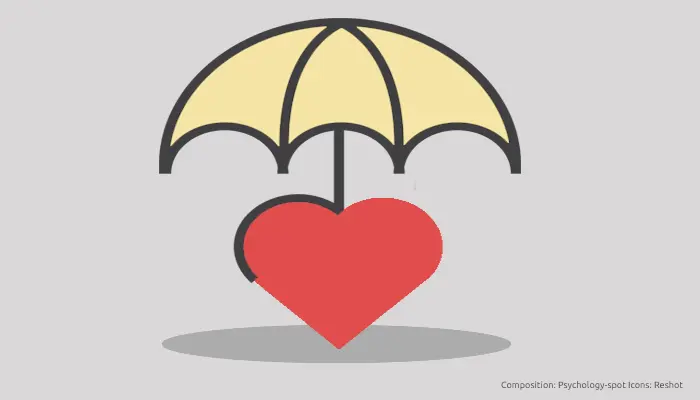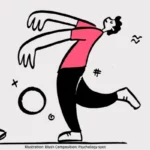
The death of a loved one is one of the most complicated situations we have to face in life. Knowing that that person is no longer there, that has gone forever, causes enormous pain and a feeling of unfathomable emptiness.
Nothing prepares us for that suffering. Words are not enough balm to heal the wound. We must let time pass and go through the pain. However, knowing the emotional and physical consequences of that loss can help us better understand what we are experiencing. So we can treat each other with greater benevolence while we accept the new reality.
How does the death of a loved one affect?
We all know that death is part of life, but despite this, when a loved one leaves us permanently, it is difficult to take the blow and accept that we will have to move on without that person.
Everyone reacts differently and uses their own coping resources to cope with that pain in the best possible way. However, although each suffering is unique, it is practically impossible to avoid a series of feelings that shake our inner universe.
• Shock and emotional numbness. Shock is usually the first reaction to the death of a family member. It is usual that during the first hours, days or weeks we experience a kind of emotional analgesia that allows us to continue as if nothing had happened. It is a defense mechanism that protects us so that our mind can process what happened. In many cases, that feeling of emptiness or indifference is accompanied by confusion and disorientation.
• Pain. The loss of a loved one is a devastating experience, which is why it often causes great pain. It is a particularly intense suffering that is reflected both emotionally and physically. Many people describe it as having lost a part of themselves, been cut in two, or had their hearts ripped out.
• Anger. When someone dies, we not only feel sad, it is also normal to experience anger and rage. Death can seem cruel or unfair to us, especially if it is a young person or if we had plans for the future. We can feel very angry with the person who died for “abandoning” us, but we can also feel angry with ourselves or with the world.
• Guilt. Guilt is another common reaction to the loss of a loved one, and one of the most difficult to manage. We can feel guilty directly or indirectly for the death of that person, for not having been closer or not having been kinder. If we don’t assertively address that guilt and let it grow, it often leads to a spiral of self-incriminating recriminations that prevent us from moving on from what happened.
• Sadness. Obviously, the death of a relative also tends to generate feelings such as sadness, nostalgia and loneliness. At certain moments, it even seems to us that nothing matters anymore or that everything has lost its meaning. If we are not able to deal with these emotional states, we can fall into depression. In fact, up to 50% of people who have lost their partner present depressive symptoms during the first months after the death. After a year, 10% end up developing depression.
In this sense, a study carried out at Columbia University revealed that the death of a loved one significantly increases the risk of developing mental problems, especially mood disorders such as anxiety or depression.
The death of a family member is one of the most stressful situations in life, so its consequences are not limited to the emotional level. In fact, the stress it generates usually affects us physically, spreading through all the organs, especially attacking the immune system.
A research conducted at the University of Sydney, for example, found that immune cell function decreases and inflammatory responses increase in people who are going through a period of grief. That is one of the reasons why we get sicker and take longer to recover after losing a loved one.
A study developed at Harvard University went a step further by discovering that the chances of dying increase when we are in mourning, especially if we already suffered from a previous pathology, a phenomenon known as the “widowhood effect.”
In fact, Swedish researchers found that people with heart failure who had lost a family member were more likely to die during bereavement, especially in the week after the loss.
The death of a spouse or partner increases the risk by 20%, the death of a child by 10%, and the death of a sibling by 13%. The risk was especially high for those who suffered two losses: a 35% increase, compared to 28% for a single loss.
Coping with grief, one step at a time
Time is a great wound healer. As the days go by, we accept the loss. However, approximately 7% of people get stuck in denial, anger, or sadness. They experience a complicated or not elaborated grief. To avoid this, it is important to follow a series of guidelines:
• Give yourself permission to feel. Grief unleashes a wide range of emotions. It is important that we not tell ourselves how we should feel and not allow others to tell us what we should experience. In the face of loss, it is essential to acknowledge our feelings, even the most painful ones, and allow ourselves to grieve. Ventilating the suffering will help us overcome.
• Be patient and treat ourselves kindly. Each person follows his/her own healing rhythm. It is essential not to push yourself and be patient. We must accept that we need to experience all those emotions. Healing will come in due time. Therefore, it is important that we do not put pressure on ourselves and treat ourselves with kindness and benevolence throughout the process.
• Maintain life habits. When someone close to us dies, we often feel like our world is collapsing. Maintaining certain daily routines will allow us to give our lives some order and keep us busy, which will help us regain security and confidence in ourselves.
• Talk about the loss. Many people withdraw into themselves after a loss, but sharing the pain helps to heal. Talking about the loss, the memories and the experiences shared with that loved one allows us to process what happened. Putting into words what we feel is a way to integrate that loss into our vital history.
As a general rule, the pain and sadness fade as the months go by, until they practically disappear after a year. Although there is no standard period to go through grief and we do not usually go through its phases progressively, but experience setbacks and ups and downs, if the pain does not subside, it is important to seek psychological help.
A psychologist can help us better deal with the death of a family member from the start. It will help us deal with the sadness, guilt, or anxiety that the loss generates. He/she will not be able to spare us the pain, but he/she will give us the tools to cope better and, above all, he/she will help us through the grief so as not to get stuck in any of its phases.
Undoubtedly, recovering after the death of a loved one takes time. Having support, not only from friends and family but also from a psychologist, can make this process less hard and more bearable. This way we can preserve our mental health and recover a certain degree of well-being that is, after all, what that person would want for us.
Sources:
Chen, H. et. Al. (2022) Bereavement and Prognosis in Heart Failure: A Swedish Cohort Study. J Am Coll Cardiol HF; 10 (10): 753–764.
Keyes, K. M. et. Al. (2014) The Burden of Loss: Unexpected death of a loved one and psychiatric disorders across the life course in a national study. Am J Psychiatry; 171(8): 864–871.
Buckley, T. et. Al. (2012) Physiological correlates of bereavement and the impact of bereavement interventions. Dialogues Clin Neurosci; 14(2): 129–139.
Moon, J. R. et. Al. (2011) Widowhood and Mortality: A Meta-Analysis. PlosOne; 10.1371.



